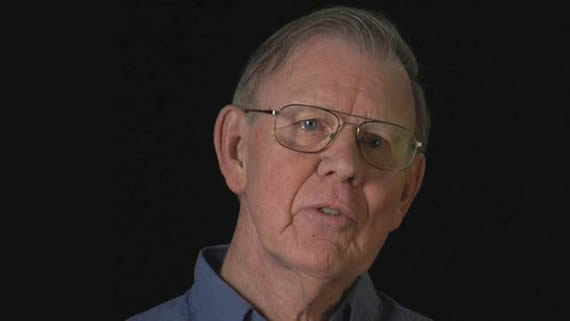Almost every time David S. Wyman delivered a lecture related to his remarkable book, The Abandonment of the Jews: America and the Holocaust 1941-1945, someone in the audience would ask: “Why would you, a Christian, take a such strong interest in a Jewish issue?” Prof. Wyman found the question genuinely puzzling. To him, it was a given that a human being, no matter what his or her religious faith, should care—and act—when innocent people are persecuted.
David S. Wyman was born in Weymouth, Massachusetts, in 1929. Before finding his calling as a historian, he worked as a parts shipper, a milkman, a printer, and a sixth-grade and high school teacher. Wyman graduated from Boston University with an A.B. in history and from Harvard University with a Ph.D. in history. At Harvard, his studies were assisted by a Woodrow Wilson Fellowship.
The grandson of two Protestant ministers, Wyman never allowed his personal beliefs to influence his meticulous scholarship. But as his research led him to realize how little Christians in America did in response to news of the raging Holocaust, it shook him to his core. He said there were times when he “cried for days” over his discoveries, and would have to take a break from the research. David Wyman was the most admirable kind of historian: a historian with a heart.
From 1966 until his retirement in 1991 he taught at the University of Massachusetts, Amherst, where he was professor of history and twice chaired the Judaic studies program. Offered the opportunity to name his professorship, Wyman chose to honor the late hero of Holocaust rescue, Josiah E. DuBois, Jr.
During the 1960s, when Wyman was researching what would become his first book, the widespread assumption among the American public was that there was little or nothing the Roosevelt administration could have done to save Jews from the Holocaust. Wyman’s work shattered that myth. His first book was Paper Walls: America and the Refugee Crisis, 1938-1941 (University of Massachusetts Press, 1968). The sequel, The Abandonment of the Jews: America and the Holocaust, 1941-1945 (Pantheon, 1984) became a New York Times best-seller.
Prof. Wyman’s groundbreaking research revealed that U.S. planes were within a few miles of Auschwitz and could have bombed it, without detracting from the war effort; that immigration quotas were woefully under-filled, even as Jewish refugees were being turned away from America’s shores; and that the Roosevelt administration deliberately suppressed news about the mass murder of the Jews, fearing that publicity would increase pressure on the president to do something to help them.
The Abandonment of the Jews won award after award. The reviews, both scholarly and popular, were nearly all laudatory. “We will not see a better book on this subject in our lifetime,” Prof. Leonard Dinnerstein wrote, in a typical comment. Prof. Wyman was awarded honorary degrees, inundated with speaking invitations, and featured on major television and radio shows.
But what Wyman was most proud of was the fact that his book not only educated Americans about their country’s response to the Holocaust, but helped ensure that another persecuted Jewish community would not be abandoned–when his book played a key role in the U.S. decision to rescue more than 800 Ethiopian Jewish refugees stranded and starving along the Ethiopian-Sudanese border. Vice President George H.W. Bush subsequently sent Prof. Wyman a handwritten note of thanks for inspiring the rescue mission.
Wyman also authored A Race Against Death: Peter Bergson, America, and the Holocaust (with Rafael Medoff (The New Press, 2000); edited America and the Holocaust (thirteen volumes of the documents used in The Abandonment of the Jews, published by Garland in 1990); and edited The World Reacts to the Holocaust (Johns Hopkins University Press, 1996).
Prof. Wyman passed away on March 14, 2018, at age 89.

